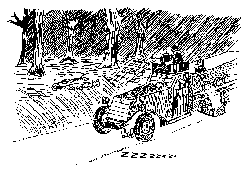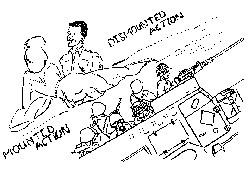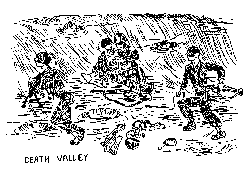| History - 49th A.I.B. - Company 'B' |
 | Index
|
| Index
| | Next |
| Next |
|
(Pages 21-24)
|
5 March (con't)
plagued them every step of the way. It was fully an hour before the last elements made the house. Meanwhile tanks had been sent up to support the men, and although a tank was hit and set afire by a shell from the anti- tank gun, they managed to knock It out.
The battle had come on us with such rapidity that the supporting platoons had no chance to find out what had happened at the head of the column. The second platoon, which had followed behind the third platoon dismounted and moved up to support the third platoon, but were met by heavy fire, and forced to take cover behind the tanks. The third platoon, meanwhile, had reached the house, and S/Sgts. Taylor and Galletti, with about twelve men cleared the house, flushing out 25 soldiers and 10 civilians. Mortar fire commenced to land at this time. The infantry, working with the tanks, drove the enemy from their positions, but these positions were well emplaced and strongly held, and in taking them we had suffered serious casualties. Pfc. Victor Gabrick, Pfc. Edward Herrera, and Pfc. John Gallagher had been killed. T/5 Lavon Swank, Pfc. Elbert Brewster, T/4 Michael Werner, Lt. Timothy Kenneally, Pfc. Carroll Guinn, Pfc. Harry Kessel, Pfc. Edward Taylor, Pfc. Elmer Kombrink, Pfc.
Dwight Craig, Pfc. Andrew Triano, and Pfc. John Meinkoth were injured.

|

Some of these wounded were lying in exposed positions, and the medics, coming to the aid of these men through the fire, suffered casualties. Pvt. Lawerence Twickler, a medic's aid. and medics Pfc. Glen Parmelee and Pfc. Michael Holzman were hit while attending the wounded, and Pfc. Fred Bridges, coming to the aid of the medics was also wounded. Cpl. Pat Moran, aiding the wounded, spied two snipers shooting from a building three hundred yards to the left front, and picking up his rifle, dropped them both. We were hard hit, but we kept tenaciously at the enemy, and it was he who was finally forced to withdraw. The second platoon, already suffering one casualty in Pfc. Diddie Blank, moved up to the crossroads, cleared several pill-boxes and bomb shelters along the way, which were found to be abandoned, cleared houses, and captured a few prisoners. They moved up the road to the right, and set up a defense in a creamery.
At 1600 both platoons were withdrawn, and placed In reserve, while the company aimed another drive at Winterswick. We were picked up by tracks from C Co., and rode to the outskirts of Winterswick. Here we dismounted and started out on foot, with the first platoon on the left of the road, the fourth platoon on the right, and the second and third in support. The tankers, earlier in the day had tried to take the town without infantry support and had been met by
|
-- 21 --
|

panzerfausts. They had taken a terrific beating. The platoons moved up towards the town under heavy enemy artillery fire. The first platoon reached and secured the houses on their side of the road, but the fourth platoon suddenly came under direct fire from 88s and two shells hit their positions with deadly accuracy. The second platoon, coming up in support, located one of these guns, and laying down bazooka fire on It, were able to pin the crew down until a tank could be brought up to knock it out. The fourth platoon then continued to advance clearing out the houses on their side of the road and flushing out a great number of prisoners. The men detailed to take prisoners back were harassed by heavy artillery fire and were forced to take cover at every few steps.
The fourth platoon again moving forward was pinned down by burp gun fire, which seemed to come from around a house set back from the road to the right. Tanks blasted this position, and T/Sgt. Lowery, taking Pfc.s Jim DeDecker, Errol Davis, and Antonio Titario, advanced on this position and captured the house, which yielded a captain and over fifty prisoners.
These men had been manning several 20 mm. and 88 mm. guns in the area, but had taken to the cellar when the tanks cut loose. A short time later we were relieved by the 35th Infantry
|
Division and were withdrawn for the night.
Winterswick had been won, but not without losses. Pfc.s William Urban, leon Mormon. and Willard Evans had been killed, and Pfc. Mike Pavich, Pfc. Clarence Freitag, Pvt. Toye Richmond. Pvt. Lloyd Haycraft, Pfc. Charles Zinderstein, and Pfc. J. D. Bowman were injured during this operation. Captain Clarence E. Smith, who ran the company despite personal risk and had been directing the attack on Winterswick, was killed in the turret of a tank by the heavy shelling. He had been coordinating the attack from outside the tank but had been forced to seek more cover from the flying shrapnel. His death and the others we had suffered during the day had shaken the company, but we continued even more fiercely to root out, kill, and pursue the enemy, forcing them to give up positions they had been instructed to hold at all costs.
We won't forget the pounding we took that day. The marks of it were on our faces and in our eyes. Events had happened so quickly that it had left us half stunned, and men many of us had known and loved had been suddenly wrenched from us, some never to return, and the violence and emotional strain of the day left us exhausted and nerveless as the tension was relaxed. Nobody laughed much that night.

|
-- 22 --
|

6 March
Prisoners came pouring in all day. The battlion total was almost 350, and from these prisoners it was learned that we had been facing units from a Panzer Grenadier Regiment, the 7th Parachute Division, the 20th Parachute Regiment, the 1225th Infantry Regiment, the 190th Infantry Division, and other miscellaneous units. Several men whose outstanding actions won recognition were later decorated. T/Sgt. Lowry was later promoted to lieutenant, and received the Silver Star for his work as Winterswick. Sgts. Cappelleti, and J. A. Taylor were later decorated with the Bronze Star for their work in organizing their platoon and securing positions at Lintfort. T/4 Doyle. who did a magnificent job in aiding the wounded, and organizing their evacuation, was awarded the Bronze Star, also. Lt. Meech had been the senior officer on the spot and had taken over the company when Capt. Smith was killed, and Lt. Bell took over the command as soon as his duties as Motor Officer could be discharged.
8 March
After two days of comparative rest, we mounted up in the tracks and drove to Rheinberg, where we dismounted and
|
pressed on on foot towards the primary battalion objective at Ossenberg. We were delayed here due to stiffening resistance on the flank which was stalling the 35th on the flank, but once more pushed forward, with the second platoon in the lead. Co. C, in front of us ran into opposition, and got pinned down, blocking our advance, and forcing us to stop in on open field. The enemy evidently had observed fire, for this area at once was subjected to a tremendous mortar and artillery barrage. The second platoon, being in the lead on this operation, naturally took the brunt of this fire, and suffered the most casualties. They moved into houses, and the rest of the platoons moved up through the fields to seek cover. The area was so plastered with shell craters that to those who saw it later, it scarcely seemed possible that so much as a mouse could have crossed that field without being hit. We dubbed it, with good reason, 'Death Valley'.
When the way became cleared, we pressed on to the first objective. The first platoon took over the lead, and moved out to clear the houses on the outskirts of Ossenberg. The work went forward under difficulties, for there was artillery and mortars raining in, and snipers were active, which added to the general confusion. Many prisoners were taken along the way.

|
-- 23 --
|
The first platoon cleared the houses and dugouts while the third platoon held them. The fourth platoon was flank guard for the tankers who were setting up a base of fire. They drew fire from 88s, and suffered a few casualties from them.
Artillery fell during the day and throughout the night. We set up a defense and had some chance to relax, but few men got much sleep. During the last few days we had had enough artillery thrown at us to last us a lifetime, and it is doubtful that any of us will get any pleasure out of a fireworks display again. We had heard that those 88s could drop a shell in your back pocket, we now knew that they could specify which back pocket.
There wasn't a man among us who hadn't suffered a near miss that day, and many who had been hit. Pvt. Frank Dowdy, Pvt. Gustave Burtcher, Pvt. John Heath, S/Sgt. Darland Jacobs, Pfc Martin Halttunen, Pfc. Peter Bleskan, Pfc. Silvio Salvestrin, Pfc. Ernest Melendrez, Pfc. Ray Sena (for the third time in three weeks), and Pfc. George Leveille were wounded. S/Sgt. Robert Hardin was wounded when coming to the aid of Leveille. Pfc. James Abersold was killed in this action. Once again the price that we had paid to accomplish our mission had been heavy.
10, 11 March
The third platoon withdrew from the outposts, after the 35th Division had

|

bypassed us and captured the town of Borth, beyond. The days were generally fairly peaceful, and hot chow came regularly. On the 10th, Pfc. Robert Flum was wounded. On the 11th we mounted up and pulled bock to the rear for a rest, a much needed and very welcome rest. We arrived in Venlo, Holland, at 1600.
We were greeted in Venlo as conquering heroes, for the city had been recently liberated. We don't know who liberated it, but we took it over. We stayed here in Venlo enjoying the warm reception of the Dutch families, and their beautiful daughters. After that tough deal at Llntfort this was heaven. We stayed here until the 26th of March, and the whole company took every advantage of the much needed rest. Of course there was a training schedule - - not too tough, but still a reminder of things to come. The training that we took almost every day consisted mostly of preparing us for crossing the Rhine River. Such as river crossings, mine training, BAR training, sandtable lecture on the east bank of the Rhine River, and of course Orientation lectures.
Later on Scotty managed to procure some twenty odd gallons of brandy, which was consumed with
|
-- 24 --
|